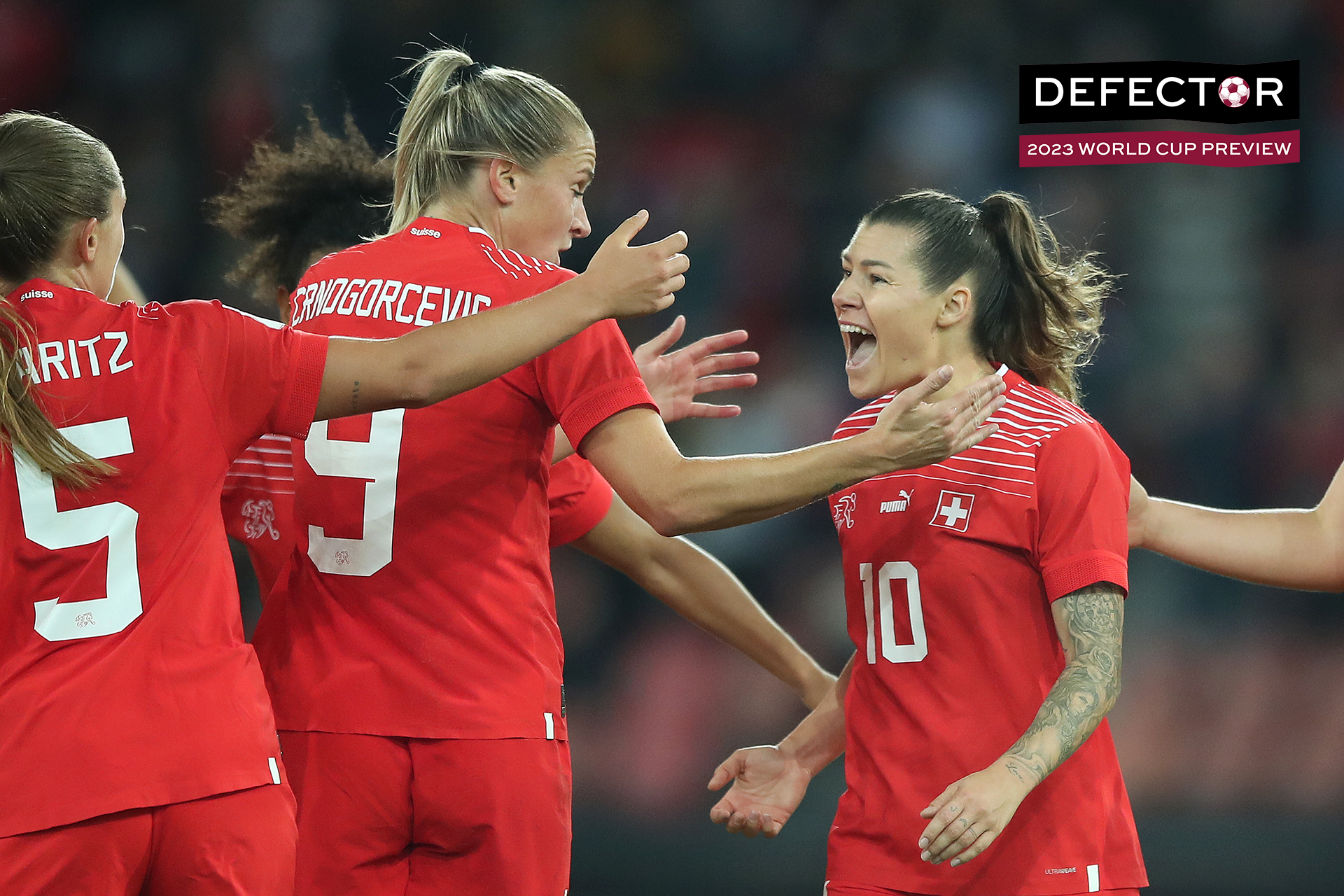It’s almost time for the 2023 World Cup. To help get you ready, we will be providing you with precious information about every team in the tournament. You can read all of our team previews here.
There's a tier of European soccer nations that can't take any success for granted. Below the level occupied by teams like England, France, and Germany, there are a handful of sides for whom getting to a World Cup is the most important goal. Switzerland sits in that second tier.
Given their recent soccer history, the Swiss can't take anything for granted. That was the lesson the last time La Nati tried to qualify for the World Cup, in 2019. After making their debut in 2015, and then their Euros debut two years later, spirits were high in Switzerland. They had a couple of great players in Ramona Bachmann and Ana-Maria Crnogorčević, they had the experience of making it to the round of 16 in 2015, and they outplayed France in a 1-1 draw at the 2017 tournament (that draw kept Switzerland out of the knockout rounds, but not for lack of trying). Things looked on the up and up, right up until they got steamrolled by eventual World Cup finalists Netherlands in the playoff final for Europe's last qualifying spot for 2019.
There's no shame in being knocked out of the tournament bracket by a team that eventually made a run to the final, but Switzerland followed that up with an actual debacle at the 2022 Euros last summer. A 2-2 draw against Portugal, no one's idea of a great side, set the Swiss on a dangerous path in a tough group, and losses to Sweden (2-1) and the Netherlands, again (4-1 in a game that was 1-1 until the 84th minute) kept Switzerland out of the knockout rounds. Since then, the side has had to fight through another playoff to even make the 2023 World Cup, though they did just that, beating Wales 2-1 in extra time back in October to punch their ticket.
And so here they are again, in a manageable Group A. Switzerland should be the favorites to finish second in the group behind Norway, and there's an outside chance of finishing first, perhaps as much of a chance as there is of them finishing third and missing out on the knockouts for a second consecutive tournament. The scheduling gods blessed Switzerland with the Philippines first; while any side that makes the World Cup should be celebrated, the Asian first-timers should not be too much of a problem for Switzerland. That then leaves them with needing, most likely, one point from two matches against Norway and New Zealand. A win against either would not just virtually ensure qualification to the knockout rounds, but perhaps the easier path that comes from winning this group.
Anything less than second place would be a disaster for a Swiss team on the verge of an incoming age-related rebuild. The two best players on the team are 32 years old, which is fine for this tournament but less so for the next World Cup. The youth movement behind them is there, and there are stars-in-the-making at the country's disposal, but progress isn't linear, nor is it guaranteed. This is Switzerland's best chance to synthesize both aspects of its roster into one cohesive side before things shake up for a new generation. The draw was favorable, the players are there, now it's just a matter of not blowing the country's best side of making a World Cup run for the ages.
Who Is Their Star?
When Switzerland made its debut at the World Cup in 2015, Ramona Bachmann was the toast of the town. The then-24-year-old forward had been playing in Sweden, but used the tournament in Canada to break out, scoring a hat trick against hapless Ecuador in a 10-1 win, Switzerland's only points in that World Cup. That was enough to secure Bachmann a high-profile move to Wolfsburg, the royalty of German women's soccer, where she somewhat floundered. A move to Chelsea followed, as did two Women's Super League titles, before she moved to Paris Saint-Germain during the pandemic stoppage in 2020.
That's quite a career for one of Europe's former great prospects, but Bachmann is now 32 and no longer the hyped-up youngster she was during her last appearance at the World Cup. Instead, she is one of this Swiss side's elders, fighting more against the history of La Nati than against any of her teammates for playing time. She is currently Switzerland's third-most capped player, and the country's second leading goalscorer all-time; number one is Crnogorčević, who is also making the trip to Australia and New Zealand.
Regardless of how that race for top scorer eventually turns out, Bachmann still has a lot left in the tank as Switzerland's maestro. There's no one on the team with her ability on the ball, whether that's dribbling by opponents—something she does at a high clip of roughly two take-ons per game—or setting up her teammates. Among wingers in the top eight competitions in the world, Bachmann is in the top one percent for passing percentage (79.4) and in the top six percent for passes attempted (47.1 per 90 minutes). The latter number should only go up once she is removed from the relatively star-studded PSG lineup and inserted into her home country's, but the concept for how to utilize Bachmann is the same: Give her the ball, give her some space and runners ahead of her, and she'll make magic happen.
Oh, and she can score too, if that wasn't clear:
Whether that will be enough for Switzerland remains to be seen, but Bachmann is the best hope La Nati has of a dominant solo performance at this World Cup. Given her age, this could be Bachmann's last chance to shine at the premier tournament in the world. She'll give it a shot, at the very least, and she'll be especially locked in for the country's opening match against the Philippines. A big win there, akin to that 2015 thrashing of Ecuador, could help tilt the scales in Switzerland's favor, and Bachmann has experience pressing her cleat on an overwhelmed opponent's neck. If she catches fire in that match, then Switzerland might just have to hang on as she spins and jukes and feints her way into World Cup lore.
Tell Me About A Cool Youngster
Regardless of what happens at the World Cup this summer, Riola Xhemaili is about to be a much bigger name in European soccer. That's what happens when a player makes a move to Wolfsburg, one of the continent's premier women's teams and the most recent Champions League runners-up. Xhemaili is only 20, but already she has made her mark in the German league, starring for Freiburg since moving from Basel in 2021. In her debut season for the German side, Xhemaili notched six assists in 21 games to lead Freiburg, and while her second season saw her counting stats drop (only one assist, though she did up her goal tally from one to three), it was good enough to earn her a free transfer to Wolfsburg ahead of the 2023-2024 season.
What makes Xhemaili such a great prospect? She has poise on the ball that belies her age, making her a steadier presence in the midfield than one would expect from someone just freshly out of her teenage years. Though she plays more of an attacking midfielder role, she might have to play a bit further back in order to get game time alongside Bachmann, who plays as a classic No. 10 more often for the national team. However, there is a world where manager Inka Grings plays Xhemaili and Bachmann both in advanced positions, and that's when Switzerland's attack could get really nasty for opponents.
That's because adding Xhemaili's creativity in the passing game to Bachmann's dribbling could stretch defenses out wide, opening up the center of the park for Crnogorčević. It's hard to say that a 20-year-old will demand that much attention, but Xhemaili has been that good for Freiburg. She's smooth with both feet in the center of the park, whether that's creating space for herself or dropping off passes to runners on the wings. Give her enough time this summer, and Xhemaili might just be able to direct Switzerland's offense through her calm yet deadly feet. At the very worst, this tournament could turn out to be her breakout before she moves to one of the elite sides in Europe. Next time around, she might just be Switzerland's star.
Who Is Their Enemy?
Switzerland's biggest local enemy is Austria, but since their neighbors to the east did not qualify for the World Cup, the real nemesis might be that of form. Switzerland is in putrid form as a team since barely edging out Wales in the World Cup qualifier playoffs back in October. Since that extra-time win, Switzerland has played four games, three of them against non-World Cup opposition. The results haven't been great: two draws against Poland in February, another draw against fellow tournament goers China in April, and most disconcertingly, a 2-1 loss to Iceland, the highest ranked team who missed the World Cup.
The Swiss will have two more warm-up matches before the tournament, facing African debutantes Zambia and Morocco on home turf on June 30 and July 5, respectively. While friendlies are never the most important of outings, Switzerland could really use a couple of hardy wins in those games to ride some momentum into the tournament. Given their relative lack of recent success as a national side, any bit of spark could help them improve on last summer's Euro performance. They might say that "form is temporary but class is permanent," but at a certain point, a team needs both to ride out the jagged ups and downs of a summer tournament, and Switzerland has not put its best foot forward in preparation for that. Turn it around with the tournament roster against Zambia and Morocco, though, and things could look much different heading into the World Cup.
National Folk Hero Who I Think Is Cool
What's that? My goodness, it's William Tell's music!
If you have one of the most famous pieces of music written about you, then you're probably a pretty sick folk hero for a country to have. According to the legend, Tell is a symbol of revolution and resistance to power, having assassinated a dictator lord from the Austrian House of Habsburg in the 14th century.
That's pretty badass, doubly so when considering the specifics of the tale that became wider legend. Tell was supposedly arrested by Albrecht Gessler, the lord in question, for not bowing to a hat (Europe, man), but was given the chance to save his life and that of his son. All he had to do was, say it with me, shoot an apple off his son's head.
Tell did so, while taking out a second crossbow bolt. When asked why he had taken out two bolts, he replied that he would have killed Gessler with the second had his first shot had killed his son, rather than split the apple. This enraged Gessler, who imprisoned him, but then later released him when the boat carrying his prisoner was caught in a storm; Tell was supposedly a great sailor, and Gessler's men begged the lord to release him in order to save the vessel. Tell instead crashed the boat on purpose and led Gessler and his men on a chase, before using that aforementioned second crossbow bolt to kill the lord, supposedly starting a revolution against the Austrians, and earning Tell his place in Swiss legend.
Scran Or Not Scran: National Dish Edition
While fondue might come to mind first when it comes to Swiss food, rösti is closer to a "national dish" for the Alpine nation. A potato pancake of sorts, it can be topped with a bunch of different things, from bacon to smoked salmon to cream cheese, in order to make it less of a side and more of a meal proper.
This is too neat and tidy to be scran. I render a verdict of Not Scran.
What Would A Successful World Cup Look Like For This Team?
There's only one goal for this team come the World Cup: Get out of the group. Following the disaster at last year's Euros, Switzerland absolutely can't come in third, or fourth even, in a group that is as survivable as Group A looks to be. Sure, the hosts of New Zealand are in play, but Switzerland has more talent and experience than the Football Ferns. The group \-closing match between the two should dictate who goes through to the round of 16, and for this to be a success for Switzerland, they have to outplay the hosts ...
... That is, unless they already beat Norway. Let's get a bit crazy and think of a more successful World Cup for the Swiss. Following what should be a nice warm-up match against debutante Philippines, Switzerland will take on group favorite Norway in Hamilton. If the Swiss were to win there and put themselves in the driver seat to win the group, things get very interesting: Rather than a likely date with Spain in the round of 16, Switzerland would likely face a rebuilding Japan, who should be very beatable. Is a trip into the quarterfinals all that farfetched? Not really, though it is unnecessary in order to consider this a good tournament. It's just an achievable next level for a team that has never really hit that height before.





